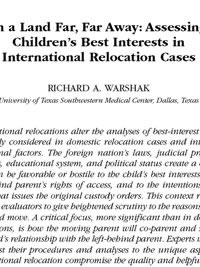STORE

SSL Certificate
Books, Articles, Videos, and Speeches by Dr. Richard A. Warshak
These links go to pages with information about each item: CR01 | CR03 | CR04 | CR05 | CR07 | CR08 | CR09 | CR12 | CR13 | CR14 | CR15 | CR16 | CR17 | CR18 | CR19 | CR20 | CR21 | CR22 | CR23 | CR24 | CR25 | CR27 | CR28 | CR30 | CR31 | CR32 | CR37| CR41 | CR43 | CR44 | CR45 | CR48 | CR52 | CR53 | CR54 | CR55 | CR56 | CR57 | CR61 | CR62 | CR63 | CR64 | CR66 | CR68 | CR71 | WBP01-02 | WBP-DL | WPQ | DP
CR52 – In a Land Far, Far Away: Assessing Children’s Best Interests in International Relocation Cases
 This paper focuses on international relocations, but much of it is highly relevant to domestic relocation cases and to cases in which there is a possibility that a parent will want to travel to, or move to, another country. The article discusses the importance of examining the stated and unstated reasons and motives for the proposed move, and lists some of the more compelling reasons that might justify a relocation.
This paper focuses on international relocations, but much of it is highly relevant to domestic relocation cases and to cases in which there is a possibility that a parent will want to travel to, or move to, another country. The article discusses the importance of examining the stated and unstated reasons and motives for the proposed move, and lists some of the more compelling reasons that might justify a relocation.
Also discussed is the manner in which a parent reached the decision to propose or oppose the child’s relocation and how this relates to the parents’ capacity to exercise good judgment when making child-related decisions. The paper presents 12 questions relevant to investigations of decision-making processes in relocation cases. Next the paper presents criteria for evaluating proposed long distance parenting plans.
The paper discusses the importance of evaluating each parent’s ability and willingness to cooperatively involve the other parent in raising the child and the meaning of stability and continuity of child-rearing arrangements. Other factors discussed are the distance and logistics of travel between the two locations and the child’s age and wishes.
Next the paper discussed factors unique to international relocations. The foreign nation’s laws, judicial practices, customs, educational system, and political status create a climate that can be favorable or hostile to the child’s best interests, to the left-behind parent’s rights of access, and to the intentions of the court that issues the original custody orders. Experts who fail to adjust their procedures and analyses to the unique aspects of international relocation compromise the quality and helpfulness of their work to the court and to the parties.
CR52, journal article